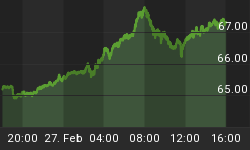The current account deficit is down as we are less reliant on foreigners to finance our deficits; the government's deficit is increasingly covered by the domestic private sector as private sector borrowing is down. -- These were the approximate words of Fed Chairman Bernanke in testimony to the House Budget Committe. This statement is so troublesome, let's examine it a step at the time.
The current account deficit reflects the amount foreigners need to buy in U.S. dollar denominated assets to keep the currency from falling. As the trade deficit shrinks because of weaker global trade, the current account deficit came down a bit last year. However, external financing is part of the current account and as the U.S. government has to raise trillions in the markets this year, it is difficult to imagine that the current account deficit will be down this year from last. It would imply that over $2 trillion in new U.S. government debt will be financend entirely domestically. Two main ways this may be achieved:
-
Money that U.S. government raises is money not available to the private sector, referred to as crowding out the private sector. We have been warning about this for some time, but if Bernanke truly thinks this is going to happen at the scale required to keep the current account deficit down, economists would be well served to revise their growth estimates for private sector growth down sharply.
-
The Fed could finance the government debt, referred to as debt monetization by economists. The Fed has been monetizing the debt already, but not on the scale that may be required to keep interest rates low or to not rely on foreigners.
More realistically, the dip in the current account deficit was temporary as foreigners will continue to play a major role in financing U.S. deficits. However, because there is less trade and foreigners could use the money in their own countries, it will be an uphill battle to attract the massive amounts needed. The task is made more difficult by U.S. policies that are at risk to leading to unsustainable deficits. The reference to unsustainable deficits come from Mr. Bernanke himself who is well aware of the challenges.
In our assessment, the cost of borrowing should increase substantially as the supply of new debt may simply dwarf the demand - in that context, it is not particularly relevant whether the demand is domestic or international; plunging bond prices in recent weeks may be a pre-cursor of what is to come. Lower bond prices imply higher costs of borrowing not just for the government, but everyone. A nascent recovery could easily be stalled in the process. That in turn may tempt the Fed to monetize the debt, although at this stage Mr. Bernanke says the Fed will not pursue this path.
With regard to foreign appetite for U.S. debt, it may be noteworthy that foreigners have indeed continued to buy U.S. debt in recent months; however, foreigners have been bidding for short-term Treasury Bills at unprecedented amounts. That implies foreigners may agree with our assessment that long term bonds are overvalued and shift to shorter maturities to mitigate potential losses should inflationary expectations rise. While this may make sense from investors' point of view, it poses yet another challenge to the government that may struggle to issue longer dated debt. In our view, the government is digging itself into a hole that may not be very different from those of consumers that took out adjustable rate mortgages, only to be caught off guard as interest rates eventually rose.















